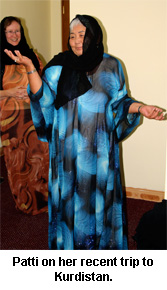
"Life gives you challenges – it’s up to you how you deal with them." This was the wisdom of Patti Idenouye’s father, a second generation Japanese Canadian who lived the internment camp experience of World War II. Like so many polio survivors, Patti was raised to be strong, to smile in the face of adversity, and to believe that there was nothing too difficult to try. She believes that these core values and beliefs helped prepare her for her professional and personal life experiences.
Patti was only six months old, when she contracted polio in 1949. She remembers nothing of her times in hospital for orthopedic surgery and she only vaguely remembers outpatient follow up clinic visits. She however has vivid and pleasant memories of being taken to weekly swims in the pool at Sick Children’s Hospital in Toronto by a volunteer from the Rotary Club,
As a result of polio, Patti grew up with a wasted right calf, a drop foot and her right leg was approximately an inch shorter than her left. The surgeries to fuse her ankle and transfer muscle tendons enabled her to walk without aids although she has always lived with the challenge of split size shoes. One size 8 and the other size 5! Patti says shoe shopping has never been one of her guilty pleasures!
Polio did not stop Patti from achieving her dreams. She graduated from University of Toronto in Physiotherapy and Occupational Therapy in 1970. She moved to Hamilton, Ontario to work as a staff physiotherapist, later specializing in lower limb amputation rehabilitation. While continuing to work full time, she went back to school in 1991 where she earned her graduate degree from McMaster University. She has held several high level management roles. In 2003 she started her own consulting firm facilitating change management and overseeing projects in both health care and academic environments until her retirement in April, 2010.
She has participated in humanitarian projects in the Balkans and Kurdistan, Iraq. For pleasure, destinations like the Carribean, Italy, Cuba, Greece, Dominican Republic, Egypt and Jordan. Patti had discovered a passion for travel!
Over the past couple of years, Patti has begun experiencing weakening of her grip strength in both hands, more instability in her right knee and a decrease in the distance that she can comfortably walk. She resorted to a single cane for the walk into Petra in Jordan last year. Her love of travel prompted her to consult a physiatrist this year. She has severe osteoarthritis in her right knee and is now “breaking in” an ankle foot orthosis which she says is helping her knee stability and walking tolerance significantly without the cane.
Patti approaches life as a polio survivor like aging with a chronic disease. Her philosophy is to set goals, identify barriers, then brainstorm and problem solve around those barriers that are preventing you from achieving your goals. Recently she has discovered how important it is to know about the existence of resources and to have timely access to the resources you need to help with problem solving. She has not experienced any Post Polio Syndrome (PPS) related fatigue and feels that changing from clinical practice to management fairly early in her career may have contributed to delaying this symptom.
Although she has not been diagnosed with PPS, Patti is not one to ‘bury her head in the sand’ when it comes to managing her own health. As someone who has been away from clinical practice since 1998, she recognizes that finding the most current information about PPS may hold the answers to some of her questions.
The March of Dimes and the Post-Polio Canada Program were one of her first contacts in her search for answers. In November, 2010 she attended a meeting of the Hamilton Polio Survivors Peer Support Group. Although the group is small, Patti has come to realize that there is a “ripple effect”. Members who attend meetings and have their needs met in turn educate their families, friends and health care professionals with whom they interact. This in turn helps to educate the community at large about life after polio.
Patti’s chronic disease management approach to her health has helped her continue to lead an incredibly full life! As well as her volunteering, she continues to travel extensively and enjoys spending time in her garden and participating in aquafit at the local recreation centre. She loves spending time with her 2 sons and their families, including 5 grandchildren and her many friends, who make up her much valued support network. Retired life is good!
Building on the foundation of her father’s wisdom, Patti says, "Experience, age and time to reflect have helped me to see that as a tiny speck in this great cosmos, I am exactly where I’m supposed to be: doing exactly what I’m supposed to be doing." And her journey continues.
